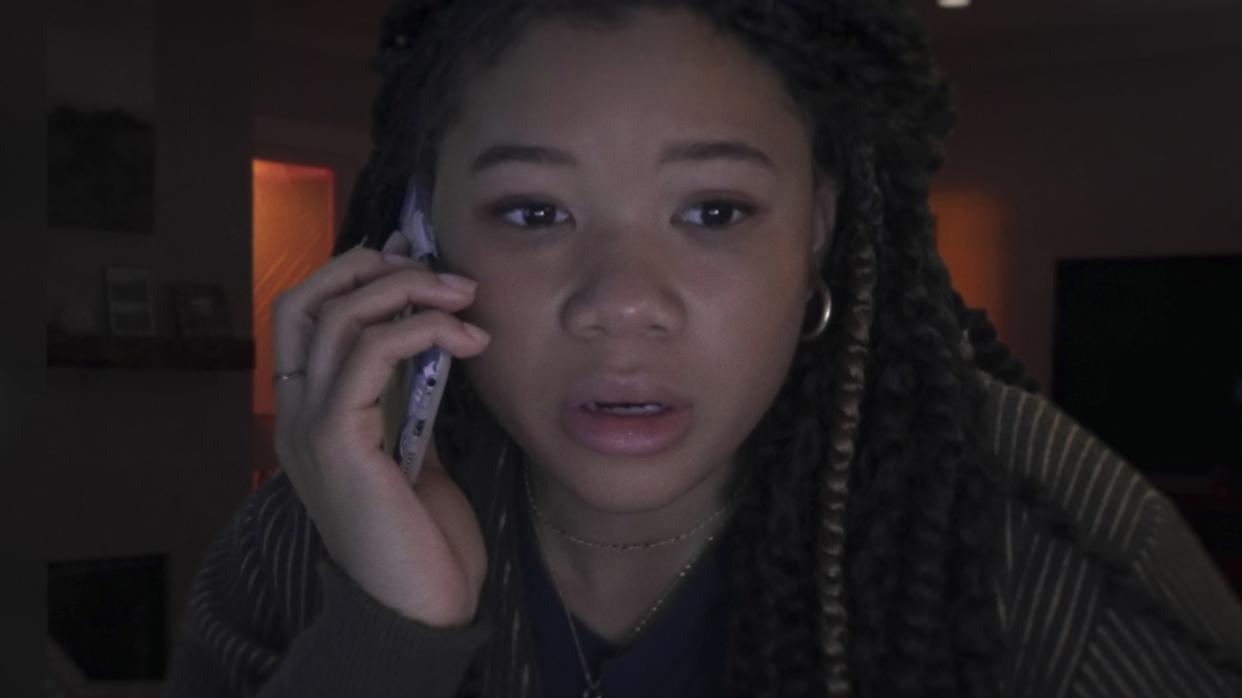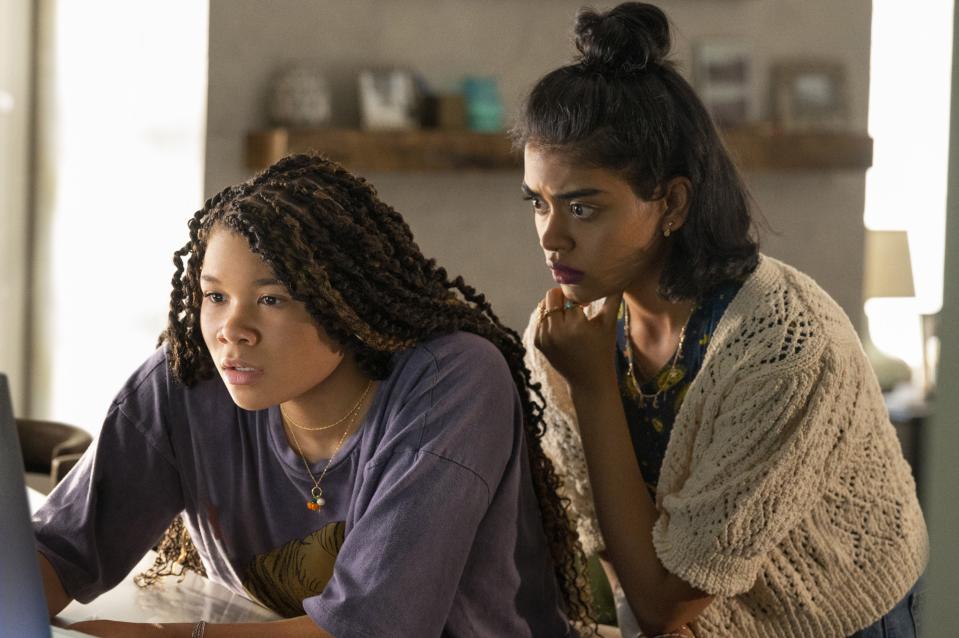‘Missing’ Review: Stand-Alone ‘Searching’ Sequel Takes Gimmick to Bigger (and Dumber) Places

- Oops!Something went wrong.Please try again later.
“Searching” wasn’t the first “screenlife” film, a term coined by director and producer Timur Bekmambetov to describe the cinematic gambit of displaying all action on various computer or smartphone screens, but it was the most commercially successful. The 2018 mystery thriller directed by Aneesh Chaganty about a desperate father, played by the perma-underrated John Cho, searching for his missing daughter grossed over $75 million and pushed the style of visual storytelling quite far, moving between simulated screencasts and surveillance footage.
As much as the film’s commitment to verisimilitude occasionally impressed, its reliance on montages of news footage and edited vlogs to compress time or convey exposition grated, as well as its frustrating shifts between first-person and omniscient third-person POVs to get around setting changes. However, Cho’s performance kept “Searching” ground in just enough emotional reality to paper over the film’s logical leaps and groan-worthy twists.
More from IndieWire
New Movies: Release Calendar for January 13, Plus Where to Watch the Latest Films
'House Party' Review: At Least This Silly Comedy Reboot Has a Solid Assist from LeBron James
“Missing,” the stand-alone sequel to “Searching,” adopts the “bigger is better” approach and features a story that spans two continents and multiple locations, and . Written and directed by “Searching” co-editors Nick Johnson and Will Merrick, with a co-story credit from Chaganty, “Missing” switches protagonist from concerned parent to distant-turned-concerned daughter, played by Storm Reid of “Euphoria” fame.
After her mother, Grace (Nia Long), and her new boyfriend Kevin (Ken Leung) fail to return from their vacation in Colombia, 18-year-old June (Reid), still reeling from the death of her father years prior, investigates their disappearance using all the technology at her disposal. Though she has intermittent assistance from the FBI and a lawyer friend, her primary aids are her best friend Veena (Megan Suri) and Javier (Joaquim de Almeida), a delightful Colombian freelancer working for a fictional Taskrabbit-esque company that helps June on the ground. What starts out as a scary missing-person case evolves into something even more nightmarish as a litany of buried secrets rise to the surface.

©Sony Pictures/Courtesy Everett Collection
It turns out that no one is who they seem, not even the protective, loving Grace.
While “Searching” mined mild comedy and relatable confusion from John Cho’s Gen X character’s unfamiliarity with certain aspects of modern social media or payment services like Tumblr and Venmo, respectively, “Missing” features a tech-savvy Zoomer whose knowledge of the Internet accelerates the film’s pace, at least in the beginning. Before the myriad narrative complications occur, “Missing” compels when June uses her ingenuity to find her mom, like how she creatively finds Kevin’s Gmail password, which helps her access all of his online accounts because, well, he’s the kind of middle-aged guy who uses the same password for everything. “Missing” persuasively captures contemporary “screen life” whenever it mimics the speed and precision with which the younger generation moves between many online platforms.
Both Johnson and Merrick get quite a bit of mileage from depicting identifiable facets of contemporary Internet usage, like the frustrating nature of CAPTCHA tests or how FaceTime and Google Street View help virtually collapse geographic distance for the purposes of sleuthing or stalking. (Is there even a difference anymore?)
Similarly, “Missing” also portrays the widespread normalization of the surveillance state, now brought to you by Ring home security systems, and the insidious influence of true crime on everyday life, specifically how spurious theories about real-life people proliferate on Reddit and TikTok as if they’re characters on a TV show. Johnson and Merrick come close to an explicit critique of these issues, but stop short and eventually land on “Hey, this is something you might recognize!”
Granted, the directors have a lot of narrative pipe to lay in “Missing,” so much so that there probably isn’t much time to incorporate overt social commentary. While “Searching” had a couple red herrings and one major twist, “Missing” features a reality-altering surprise roughly every 20 to 25 minutes. It’s frequently difficult to enjoy these revelations when they’re so predictable — there are only so many characters in the film and they’re all implicated in the conspiracy — or when they challenge even the most liberal suspension of disbelief. For them to make sense, the film’s formal device is stretched to its limit (every house has a camera at every conceivable angle!) and characters’ intelligence and social awareness needs to vary from scene to scene.
It’s also unintentionally funny whenever “Missing” slows down just enough to feature sober conversations designed to develop or resolve character arcs amidst an ostensibly time-sensitive situation. June lambasts Javier about his relationship with his estranged son right as she’s about to catch a potential culprit. There’s even time for June to have a mild spat with her friend Veena as well as extended tearful apologies when danger literally knocks at the door.
The many logic-defying developments in “Missing” make it difficult to hold one’s attention, especially considering that the film gives viewers plenty of time to think about the countless ways it doesn’t make sense. Reid does a decent job carrying the film on her back, but it would be a tough job for even a veteran actor, like Cho, to render it a legible viewing experience. “Missing” also uncomfortably feels like promotion for the utility of smartwatches and online marketplaces, not to mention a virtual assistant.
It’s not unreasonable to come away from “Missing” with the conclusion that if you’re in a life-threatening jam, the best thing you can do is ask Siri for help. She’s, after all, always right there.
Grade: C
“Missing” opens on Friday, January 20 from Sony Pictures.
Best of IndieWire
New Movies: Release Calendar for January 13, Plus Where to Watch the Latest Films
Sundance 2023 Movie Deals So Far: Music Box Films Nabs 'Other People's Children'
Sign up for Indiewire's Newsletter. For the latest news, follow us on Facebook, Twitter, and Instagram.

